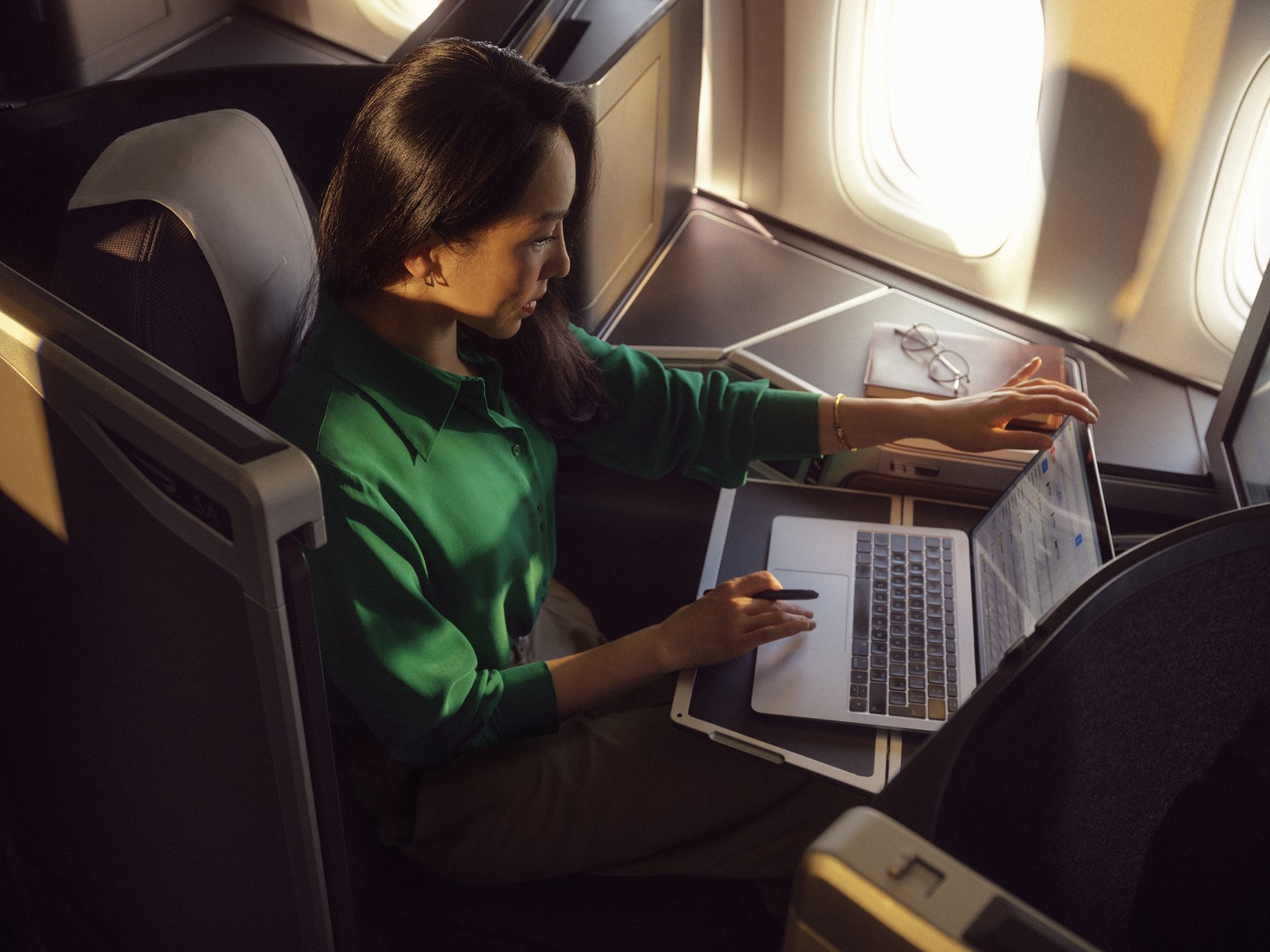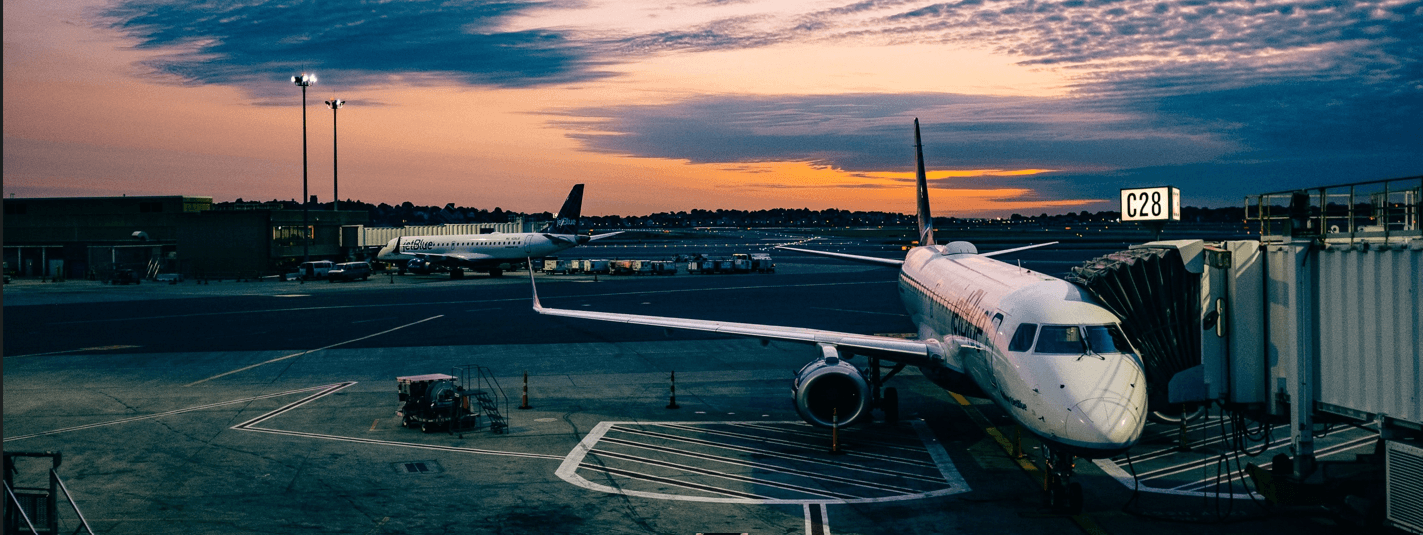The Future Trends of Business Class Travel

Business travel is no longer about simply getting from point A to point B with a comfortable seat. Rapidly evolving technologies and shifting passenger expectations are propelling airlines to introduce new levels of luxury and efficiency.
Today’s business class is being reshaped to align with the dynamic demands of global commerce and what’s coming next looks even more remarkable.
From AI-driven bookings to hyper-connected cabins, innovation is driving every aspect of air travel forward. This goes beyond incremental improvements and airlines are reimagining the entire journey, ensuring that each traveler’s needs, comfort, and productivity are front and center. As cutting-edge solutions mature, they promise to drastically refine what travelers can expect in the skies.
Fully Private Business Class Suites
As traveler expectations continue to evolve, airlines are shifting away from expansive first-class products to focus on high-end business class suites. Carriers like All Nippon Airways, British Airways, and Qatar Airways already offer these upgraded cabin options, preserving many of the luxury elements associated with first class. Enhanced privacy, premium bedding, and top-tier service all remain hallmarks of these suites, yet the more efficient use of space makes them an attractive option for both airlines and travelers.
 Qatar Airways' fully private business class Qsuite. Photo by Qatar Airways.
Qatar Airways' fully private business class Qsuite. Photo by Qatar Airways.
Business Class Suites for Shorter Flights
What started as a hallmark of long-haul flights is increasingly found on medium-haul and even some shorter transcontinental routes. For example, Qatar Airways has introduced its acclaimed Qsuites on certain routes between Doha and Europe, providing travelers with a private and spacious in-flight environment. In the United States, JetBlue’s Mint Suites offer a similar concept for coast-to-coast domestic flights, ensuring a premium experience on journeys that may be as short as five or six hours. Likewise, some carriers now feature enclosed business class suites on flights between the U.S. East Coast and the U.K., proving that elevated comfort no longer has to be reserved exclusively for ultra-long-haul journeys.
Personalized Comfort and Technology
Modern business class suites often include noise-canceling materials, customizable mood lighting, and smart seat controls designed to maximize rest or productivity. These innovations help travelers recover from jetlag more quickly by creating a calm environment for uninterrupted sleep and relaxation. By blending advanced cabin design with user-centric technologies, airlines continue pushing the boundaries of what premium air travel can offer.
Hyper-Connected In-Flight Technology
High-speed internet connections are no longer a luxury but an essential feature of modern business class. Many airlines are adopting Ka-band solutions, with companies like Starlink rolling out low-latency satellite services for commercial aviation. Unlimited data plans and seamless roaming are emerging to accommodate the needs of business travelers who rely on stable connectivity for work, entertainment, and communication.

Real-Time Video Conferencing
As in-flight Wi-Fi evolves, video calls at resolutions as high as 4K are becoming possible, ensuring that remote meetings can proceed with minimal lag. These advances also support data-intensive tasks such as large file transfers and rapid cloud-based collaborations, allowing travelers to stay productive without delays or interruptions.
Expanding Digital Entertainment
Beyond traditional movie and TV options, passengers can access extensive streaming libraries, interactive content, and even live events. In some cases, airlines offer curated channels or user-friendly portals with personalized recommendations. This level of customization mirrors at-home experiences, ensuring that travelers can remain both engaged and informed throughout their flight.
AI-Powered Business Class Experience
AI-Driven Booking
Intelligent reservation systems are expected to completely transform how business travelers plan their flights. Predictive analytics will interpret a passenger’s schedule, cabin preferences, and loyalty status to optimize everything from seat selection to connecting flights. These platforms could even suggest strategic layovers to reduce travel fatigue, paving the way for a more streamlined booking experience.
Biometric Check-In and Fast-Track Security
Facial recognition, fingerprint scanning, and other biometric technologies are revolutionizing pre-flight procedures. Passengers can breeze through check-in and security checkpoints by simply verifying their identities through these touchless methods. This shift not only reduces wait times but also adds an extra layer of security, creating a more efficient start to the journey.

Personalized In-Flight Services
Once onboard, next-generation AI tools are expected to suggest entertainment, meals, and even sleep schedules tailored to each individual’s needs. Flight attendants equipped with real-time data will anticipate passenger preferences, making service more proactive and efficient. By harnessing machine learning and big data, airlines aim to deliver a future in which every aspect of the journey feels personalized for the traveler.
Sustainable Business Class Travel
Eco-Conscious Cabin Design
Airlines are expected to adopt more sustainable materials in business class cabin interiors, from seats made of recycled fabrics to biodegradable amenity kits. Advanced composites and lightweight plastics may also help reduce aircraft weight, cutting down fuel consumption without compromising comfort. By embracing cabin designs that minimize waste and maximize energy efficiency, carriers aim to meet the growing demand for eco-friendly premium air travel.
Sustainable Aviation Fuels
To address aviation's environmental impact, more airlines are moving toward carbon offset initiatives and investing in sustainable aviation fuels. These alternative fuels can significantly reduce carbon emissions, while advanced engines help improve overall fuel efficiency.
In addition, carriers may introduce transparent offset options during booking, allowing passengers to contribute directly to reforestation or renewable energy projects that balance out their flight’s carbon footprint.
Zero-Emission Aircraft
Looking further ahead, hydrogen-based propulsion and electric aircraft prototypes offer a glimpse of true zero-emission travel. Airbus’s ZEROe concepts illustrate how hydrogen could power next-generation planes, potentially transforming the industry.
 Artist rendering - ZEROe hydrogen-powered aircraft at London Gatwick Airport. Photo by Airbus SAS 2024 - computer rendering by FIXION - MMS.
Artist rendering - ZEROe hydrogen-powered aircraft at London Gatwick Airport. Photo by Airbus SAS 2024 - computer rendering by FIXION - MMS.
Although widespread adoption of hydrogen and electric technology remains several years away, successful trials and continued research promise a future where business class travelers enjoy not only comfort but also the knowledge that their flight has a minimal environmental footprint.
Supersonic Travel
In the near future, air travel could witness a revival of supersonic flight, led by innovators like Boom Supersonic. Their Overture aircraft promises to cut travel times significantly on transoceanic routes, opening up possibilities for a new era of speed in commercial aviation. While the technology draws on lessons from the Concorde era, fresh engineering approaches and efficiency improvements aim to make supersonic travel safer and more sustainable.
 Boom Supersonic Overture, the World’s Fastest Airliner. Photo by Boom Supersonic.
Boom Supersonic Overture, the World’s Fastest Airliner. Photo by Boom Supersonic.
Early supersonic flights are expected to come with price tags on par with business class or even higher, making them accessible primarily to premium travelers. Economical fares seem unlikely in the short term, as the high costs of development, fuel, and maintenance necessitate elevated ticket prices. However, as competition intensifies and new technologies reduce operating expenses, there is potential for supersonic fares to become more competitive over time.
 Passenger experience on Boom Overture cabin. Photo by Boom Supersonic.
Passenger experience on Boom Overture cabin. Photo by Boom Supersonic.
If Boom Overture and similar projects succeed, the future could see supersonic routes expanding worldwide. Although initial cabin configurations may lean toward premium seating, ongoing advancements might enable more seating classes in the long run. As airlines and manufacturers refine supersonic technology, faster travel times could become increasingly within reach for a broader range of passengers, transforming the way business travelers and tourists plan long-distance journeys.
Experience the Future of Business Travel Today
As premium travel evolves, passengers can expect seamless, personalized journeys that blend efficiency, comfort, and cutting-edge technology. Carriers will likely invest more in eco-friendly materials, carbon offset programs, and alternative fuel research, ensuring that tomorrow’s travel solutions are both indulgent and mindful of the planet.
While many of these advancements will be adopted in the near future, some are already available today. If you're looking for more privacy and connectivity on your next flight, our business class flight booking experts can help you secure the best seats at the best prices.
And while we may still have to wait for AI-powered flight booking to reach its full potential, our experts at Above9 can already find you the best flight connections and exclusive unpublished deals not available on regular booking platforms.
